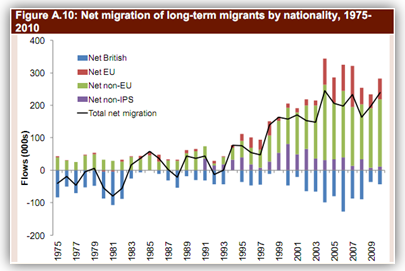
Published: 20 January 2012
Region: United Kingdom

By Patrick White
The British press has found itself in the midst of an academic fracas over the impact of migration on jobs with some news outlets claiming a study carried out by the Migration Advisory Committee (MAC) has uncovered an empirical link between migration and employment. The report suggests that 23 British jobs are lost for every 100 immigrants from outside the European economic area, a finding that conflicts directly with another study published by the National Institute of Economic and Social Research (NIESR) on the same day.
Media sources including the Guardian, the Daily Telegraph and the Sun newspapers report that the ‘explosive’ study released by the MAC, a Home Office-appointed public body, confirms a ‘displacement of British workers’ caused by immigration, a claim that sparked wide disagreement over the study’s validity.
The claim is made more controversial by the NIESR report which, using a differing methodology, finds that migration trends have no impact on unemployment numbers, strengthening the more reticent academic consensus that there is still no real evidence to assume a causal relationship between increasing immigrant populations and UK unemployment, especially in the long-term.
Professor Robert Preston of the Centre for Research and Analysis of Migration at University College London says that, although these two reports are ‘a welcome addition’ to the collected research data, a persuasive link between migration and employment remains ‘difficult’ to establish.
In addition to the claim that 160,000 more Britons are out of work due to the arrival of 700,000 migrants from outside the EU since 2005, the MAC study claims rising house prices and downward pressure on lower wages are a consequence of migration.
At a time when economic gloom is a predictable cause of social tension these reports test the capacity of newsrooms to avoid inflammatory headlines as they navigate through the complex issues raised by this difference of academic opinion.
Read the Guardian article here.
Read the Sun article here.
Read the Daily Telegraph article here.

